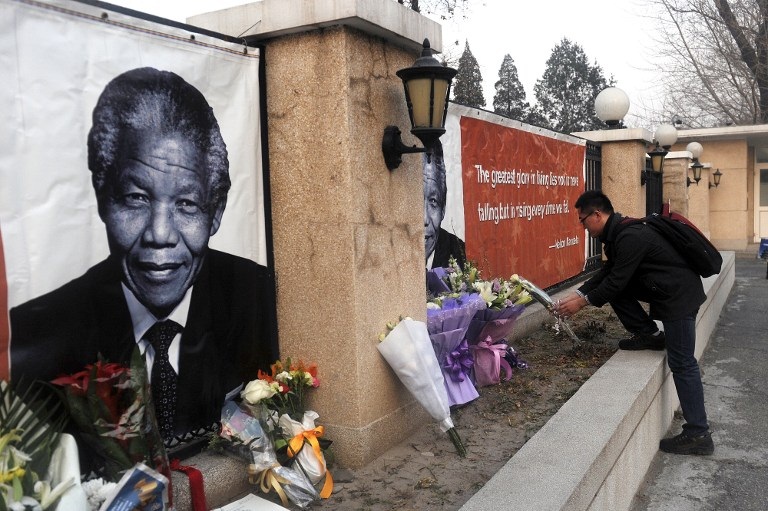Mandela's death reminds Chinese of their own pro-democracy struggle
| Publisher | Radio Free Asia |
| Publication Date | 6 December 2013 |
| Cite as | Radio Free Asia, Mandela's death reminds Chinese of their own pro-democracy struggle, 6 December 2013, available at: https://www.refworld.org/docid/52e0d60511.html [accessed 22 May 2023] |
| Disclaimer | This is not a UNHCR publication. UNHCR is not responsible for, nor does it necessarily endorse, its content. Any views expressed are solely those of the author or publisher and do not necessarily reflect those of UNHCR, the United Nations or its Member States. |
2013-12-06
 A man lays flowers in front of a portrait of Nelson Mandela outside the South African Embassy in Beijing, Dec. 6, 2013. AFP
A man lays flowers in front of a portrait of Nelson Mandela outside the South African Embassy in Beijing, Dec. 6, 2013. AFP
While China's leadership on Friday joined global expressions of grief at the death of former South African President Nelson Mandela, the country's activists said the occasion brought to mind the plight of jailed fellow Nobel Peace laureate and Chinese dissident Liu Xiaobo.
In a message of condolence to his South African counterpart Jacob Zuma, Chinese President Xi Jinping extended his sincere sympathies and those of the Chinese government and people to Mandela's family, calling the former president "a world-renowned statesman," the official Xinhua news agency reported.
Xi said Mandela, who died Thursday at the age of 95, had "led the South African people through arduous struggles to the anti-apartheid victory," the agency said.
Mandela visited China twice, and is remembered in Beijing as an active champion of bilateral friendship and cooperation, Xi said.
"The Chinese people will always remember Mandela's extraordinary contributions to ... the cause of human progress," he added.
People power
Richard Choi, deputy chairman of the Hong Kong-based Alliance in Support of Patriotic Democratic Movements of China said Mandela's death should inspire the Chinese people to remember their own "people power."
"Right now, Liu Xiaobo is still in jail, and we don't know if he will play any part in major events in future," Choi said.
"But I think that we can't just ... wait for a Chinese Mandela to emerge; the Chinese people must use every means they can to advance the cause of democracy in China," he said.
Emerging leaders
Meanwhile, Jiang Danwen, deputy director of the writers' group Independent Chinese PEN, said the equivalent of a Nelson Mandela would probably emerge in China to change the fortunes of the democratic movement.
"Sooner or later, someone will emerge, maybe more than one," Jiang said. "But an enlightened attitude on the part of the general public would be a precondition."
He said that while he hoped change would come peacefully to China, there was little sign of the necessary collaboration with the existing power structure, as had happened at the end of the apartheid era in South Africa, and for which Mandela and apartheid-era president F.W. de Klerk received the Nobel Peace Prize.
"The hopes for peaceful change are getting smaller and smaller," Jiang said. "This points to an unavoidably tragic destiny further down the road for China."
Lasting legacy
Preparations for Mandela's funeral began on Friday, as many countries flew flags at half-mast out of respect for the former political prisoner and rights activist.
De Klerk told South African broadcaster eNCA on Friday that he was "deeply sad" at Mandela's death.
"I regard his main legacy as his emphasis ... on the need for reconciliation, on the need for upholding human rights, on the need for promoting equality," he said.
"All these values which he stood for are encapsulated in our negotiated constitution. I think the best way to pay tribute to him is to uphold this constitution and to make it a living document," he said.
Liu Xiaobo
Jailed Chinese Nobel peace laureate and veteran dissident Liu Xiaobo last month agreed to appeal against his conviction and 11-year jail term for "incitement to subvert state power."
Liu, 57, who has served nearly five years of his sentence at Jinzhou Prison in northeast China's Liaoning province, is being refused visits from his legal team.
A literary critic and former professor, Liu was awarded the Nobel Peace Prize in 2010 "for his long and non-violent struggle for fundamental human rights in China" in a decision that infuriated Beijing.
However, his wife Liu Xia remains incommunicado and under strict house arrest at the couple's home in Beijing since the announcement of her husband's award in October 2010.
Friends say her mental health is deteriorating after a long period of isolation, and that the jailing of her brother has left her in financial dire straits.
Chinese dissidents, whether in jail or in exile overseas, frequently report official harassment and retaliatory action against their relatives.
Liu Xiaobo was detained in December 2008 after he helped draft Charter 08, a manifesto calling for sweeping changes in China's government that was signed by thousands of netizens.
A year later, he was sentenced to 11 years in jail for "inciting subversion of state power" in the charter and in six other articles published online.
Nobel Peace Prize
He was awarded the Nobel Peace Prize in absentia at a ceremony in Oslo in which he was represented by an empty chair.
The Norwegian Nobel committee paid tribute to Mandela on Friday, calling him "one of the greatest names in the long history of the Nobel Peace Prize."
Mandela and de Klerk received the Nobel Peace Prize jointly in 1993 for their efforts to bring about reconciliation after decades of apartheid.
"His work presents a message also today to all those who bear responsibility for apparently unresolvable conflicts," the Nobel committee said in a statement.
"Even the most bitter of conflicts can be solved by peaceful means."
Reported by Xin Lin for RFA's Mandarin Service. Translated and written in English by Luisetta Mudie.
Link to original story on RFA website
